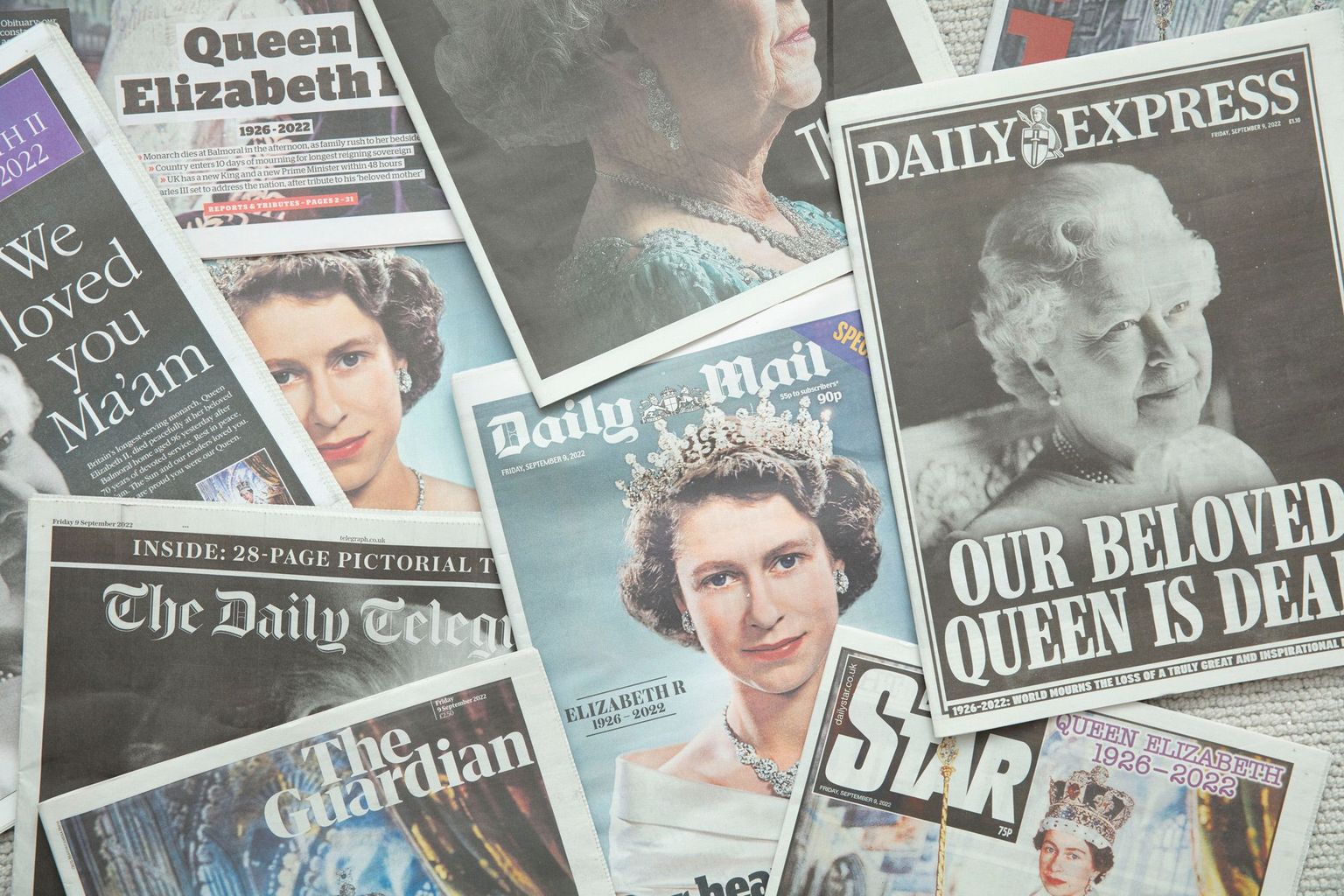The Queen’s funeral was a historical event. The media covered it like a personal tragedy.
Australians responded to the Queen’s passing in various ways—not all of them glowing. Why aren't these views expressed in our media?

Image: Shutterstock
It’s hard to pick the moment that best captured the absurdity of it all. Perhaps it was the Herald Sun claiming the Queen had been reincarnated as a cloud formation in the hours after her death. Or maybe the story about beeps being silenced at self-serve supermarket checkouts as a sign of respect. Or The Sydney Morning Herald trumpeting, “Elizabeth, the original sustainable fashion influencer”.
But as someone born in Scotland, what most made me feel like I was living through a mass delusion these past few weeks was hearing that a monument named after William Wallace—a man hanged, drawn and quartered by the British monarchy as punishment for fighting for Scottish independence—had been lit up in Union Jack colours to honour the head of the institution that killed him.
Watching the breathless coverage of the death of Britain’s longest-serving monarch has, at times, felt like bearing witness to a nation and a world in the grip of a collective fever dream. Of course, many people are feeling the Queen’s loss in a deeply personal way. As someone who loomed so large in the public consciousness for more than 70 years, she represented a lifetime of stability to many, particularly at a time of great disruption and uncertainty. Their grief is real and valid. But it’s only part of the story. And instead of covering the rest of it, the media has filtered the event through a narrow lens, leaving little room to reflect on the complexity of feeling or diversity of lived experience among the audiences they serve.
In this story, the media did not simply deliver the news of the Queen’s death—they told us how we should feel about it. Channel Seven’s funeral coverage was titled “The Grateful Goodbye”.In the demand for unquestioning public mourning, history was rewritten and marginalised voices silenced in favour of a simplistically singular piece of storytelling— one of a community united in sorrow over the passing of a woman who lived an impeccable life of service.
And it wasn’t just the tabloids. Live-blogging the funeral from Westminster Abbey on Monday, The Sydney Morning Herald’s Latika Bourke wrote that the Queen’s death brought to a close an Elizabethan era “so lauded that not even Australia’s most fervent republicans thought it possible to open the conversation while she breathed”. And yet, even when she was gone the conversation seemed impossible—not because the public wasn’t ready to have it, but because the media simply wouldn’t allow it.
The media did not simply deliver the news of the Queen’s death—they told us how we should feel about it.
In the days following the Queen’s death, I learned of directives given to staff in two national newsrooms that urged their reporters to steer away from any commentary beyond what would be perceived as “respectful”—any discussion of the role of the monarchy in modern life, the ongoing impacts of colonialism, or the appetite for a republic was deemed off limits. Instead, we were served up countless stories about the Queen’s favourite cocktails, explainers on what would happen to her lavish jewellery collection, sentimental reflections on the fate of her beloved corgis, and predictably, all the ways in which Meghan Markle has been the worst thing to ever happen to the Royal Family.
As the days progressed, the occasional missive casting a more critical eye over the institution started to trickle through—see Richard Flanagan in The Age, or Osman Faruqi on Insiders, who highlighted our politicians’ inability to “to mourn the death of someone while you discuss these big questions about Australia's future”. But these perspectives were largely lost amid the deluge of deferential coverage. In a blog post, journalist Tim Dunlop—a rare voice of reason amid the frenzy of forelock-tugging—pointed out that the media was infantilising its audience by not crediting them with the maturity to respectfully mark the Queen’s passing at the same time as having a measured discussion about the future of the monarchy.
“The way in which the mainstream has reacted to the sad death of Queen Elizabeth II highlights again the role the media plays in stifling rather than promoting, not just debate, but information itself. Rather than accurately reflecting the world in which their audience lives, giving voice to the myriad opinions such a moment conjures, journalists and their editors tried to force on us a singular, sanitised version of reality.”
The passing of Queen Elizabeth was always going to be a huge story; plans for how it would be covered were likely in place for years. What’s unclear is why that planning left no room for critical thought and anything less than round-the-clock adulation.
Take, for instance, the deep pain and trauma felt by many First Nations people and others impacted by British colonialism, which has largely been erased from the storytelling. Those who gave voice to their experience were told this was “not the time” and instructed to show respect for colonial forces whose legacy still causes them pain. When Macquarie University’s Professor of Indigenous Studies Sandy O'Sullivan said on First Nations Twitter account IndigenousX—which hosts a rotating roster of Aboriginal voices—that the Queen “wasn't a bystander to the effects of colonisation and colonialism, she was an architect of it”, the backlash was so swift and extreme that IndigenousX had to suspend their own account because they “could not provide a safe space for hosts or followers”.
The ABC dispatched 27 staff to London for the Queen’s funeral and still found little space in its coverage to speak with any complexity.
Australians like to mythologise their national identity as grounded in egalitarianism and the Ned Kelly spirit of anti-authoritarianism. And yet, with the Queen’s death, the media has presented a view of our country that is so beholden to the ruling class that anything beyond unfaltering deference is framed as incivility.
The ABC dispatched 27 staff to London for the Queen’s funeral and still found little space in its coverage to speak with any complexity on the issues of class, wealth and inequality that the monarchy raises, particularly at a time when the taxpayers who fund it are facing a prolonged cost-of-living crisis.
When Crikey questioned this deployment as a disproportionate allocation of resources, the defence from media colleagues was strident. Australian Financial Review media reporter Mark Di Stefano tweeted that it was “the most noteworthy event for decades”—a statement wildly at odds with the views of many media consumers who responded with a long list of stories they deemed more significant but which were receiving less attention, including the war in Ukraine, a global pandemic that has killed millions, and a climate crisis threatening the very future of the planet.
And therein lies the challenge for our media and our democracy: as long as those charged with the responsibility of telling our stories ignore the varied perspectives of their audiences, we’ll continue to be presented with one-track narratives that fail to interrogate the pivotal moments in social, cultural and geopolitical history with the depth and substance they deserve.
The voices we hear at times like this matter. Legacies are written into the history books by those given the space to chronicle them. Journalists have a unique responsibility not just to tell the story that’s clean and convenient, but to tell the story that’s complete.
